Engagement Feature Articles
Nissin Foods Holdings Co., Ltd. - Increasing Global Brand Value as an "EARTH FOOD CREATOR" via Food Technology
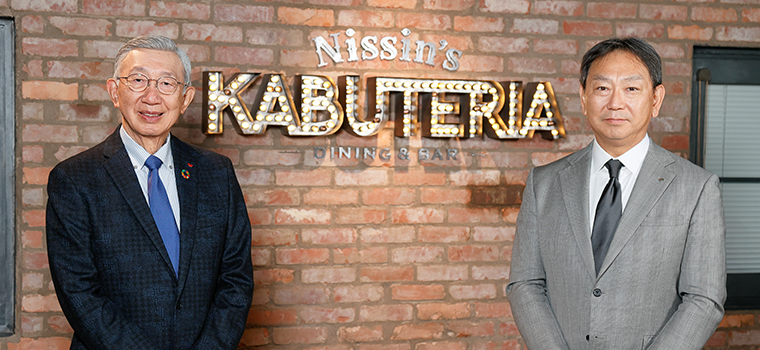
Right: Hiroyasu Koike, President and CEO of Nomura Asset Management Co., Ltd.
Starting with "Chicken Ramen", the world's first instant noodles, in 1958, the Nissin Foods Group has been pursuing the possibilities of food. By focusing on non-instant noodles and their overseas business, the company has grown into a global company with a market capitalization of more than 1 trillion yen. How is the company working to maximize its human capital to polish its brand and increase its corporate value? Mr. Koki Ando, CEO of Nissin Foods Holdings, joined Mr. Hiroyasu Koike of Nomura Asset Management to discuss the future of Nissin Foods.
A Resilient Business Structure is a Strength in Emergencies
Koike Nissin Foods Group's stock performance is solid, and you have already achieved your 2020 medium-term management plan's goal of reaching a market capitalization of 1 trillion yen. What are your goals for the next stage?
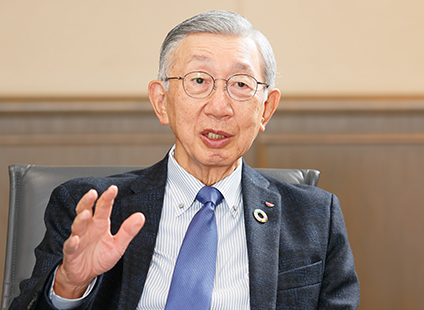
Ando We have set a new target of a market capitalization of 2 trillion yen both internally and externally. In fact, our current performance has been strong, and we plan to achieve 80 billion yen in core operating profit from existing businesses*, which we set as a 10-year target in our "Mid- to Long-Term Growth Strategy 2030" in 2020, ahead of schedule in FY2023. The average annual growth rate over the past three years is expected to exceed 20%, significantly exceeding the mid-single digit growth rate outlined in the same growth strategy. This is the result of our group's resilient business structure.
Resilience is the power to transform change into growth. In the past few years, the world has experienced a number of emergency events, including the COVID-19 pandemic, natural disasters, international conflicts, and rapid inflation, but this has generally been positive for our group's business. This is partly a result of the development of supply chain management with an awareness of such emergencies in our Business Continuity Plan, but also the result of successful cooperation between our headquarters and regional business divisions in each country. We will continue to grow through innovation and marketing when conditions are calm, and we will aim to grow even in emergencies by leveraging our resilience. For FY2030, we intend to reestablish our numerical targets of 1 trillion yen in net sales and 100 billion yen in core operating profit from existing businesses as a baseline.
*Core Operating Profit from Existing Businesses = Operating Profit - "Other Income and Expenditures" as Non-Ordinary Income - New Business Income and Expenditures
Koike What factors will be drivers of further growth in the future?
Ando Our number one driver will be food technology. People tend to think of instant foods as junky foods, but the contents have evolved considerably. The contents of Cup Noodle, one of our representative products, have changed considerably since it was first released. Another area that we are working to develop through food technology is our new business, "Kanzen Meal". "Kanzen Meal" is a product brand that provides a pleasing flavor alongside the 33 nutrients defined in the Dietary Reference Intakes for Japanese people. In the future, we may even release a Cup Noodle within the "Kanzen Meal" line. We want to spread the value in the category of health and nutrition.
Food technology isn't limited to "Kanzen Meal". It is also related to global branding and environmental issues. In order to enhance our branding capabilities, it is equally important for us to engage in innovation and marketing related to food technology overseas, just as much as within Japan. We will continue to strengthen our brand value around the world by launching products with added value and developing marketing leveraging our advantage in food technology.
Another driver for growth is the progress we're making in strengthening our management foundation. We have a "chief officer system" at our headquarters, in which the chief officer will support profit centers, whether in Japan or overseas. The evaluation criteria for a chief officer include how much they contribute to profit through their services and support of profit centers. Therefore, it is not uncommon for the president of an overseas profit center to receive support from the chief officer at our headquarters. My role is to check that this matrix is operating properly, and I feel that this structure works well.
Considering Disclosure of ROIC
Koike ROE is a key financial indicator for revenue. Your long-term target is set as 10%, which is average for the processed food industry, but I feel you could aim for a higher level. How do you view this, and have you considered disclosure of ROIC?
Ando We are always concerned about improving capital efficiency, including through measures such as dividends and share buybacks. At the same time, however, consideration for stakeholders is also important. This also relates to the resilience that I previously discussed, but we maintain adequate financial strength to support our affiliates and business partners at all times. In addition, external management issues such as fair trade, environmental issues, and nature positivity are garnering increasing attention year by year, and it is essential to address them.
With regard to ROIC, we have increased our borrowing for greater capital investment, and we would like to disclose our ROIC once we have established an effective way to utilize it. From an investor's point of view, is ROIC more of a concern than ROE, which we use as a KPI?
Koike The TSE has issued a request in this regard, and investors view whether ROIC exceeds WACC (Weighted Average Cost of Capital) as one criterion for judgment. It is becoming a trend among listed companies to disclose ROIC by division or business, and to promote the concept among employees of increasing capital efficiency. Nissin has pioneered efforts to raise awareness of its share price among employees, such as the opening of a stock-linked company cafeteria called KABUTERIA. I believe that sharing this type of information will further improve your reputation in the equity market.
What are your thoughts on cross-shareholdings?
Ando Cross-shareholdings represent a unique aspect of Japanese culture, where companies create stable shareholding relationships with their business partners. However, this runs contrary to international expectations of capital efficiency, and we have made significant progress unwinding our cross-shareholdings. We will continue to press forward with our efforts. There is no change to the concept that capital should be invested where it is profitable.
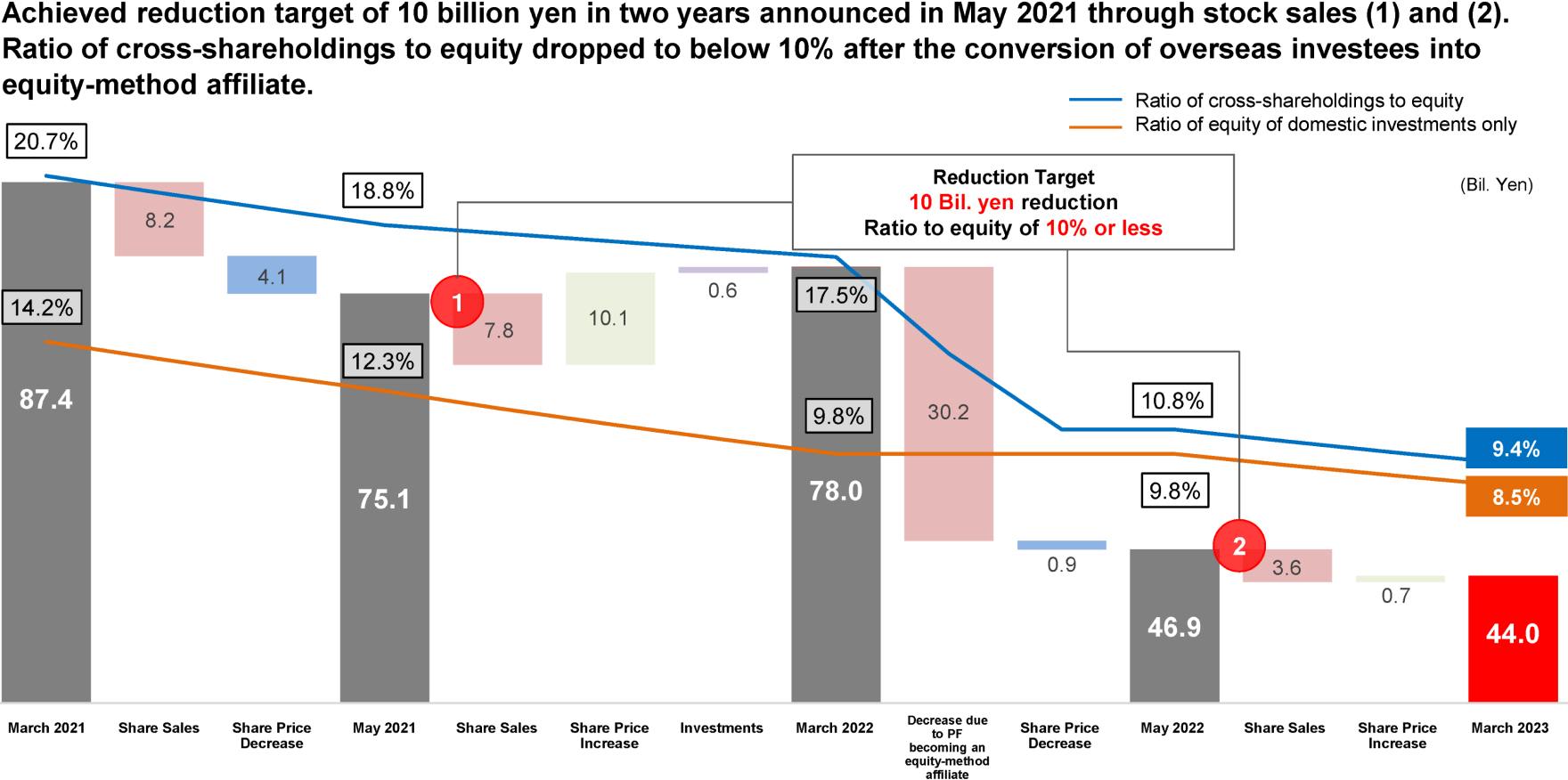
"Our People Define Our Worth"
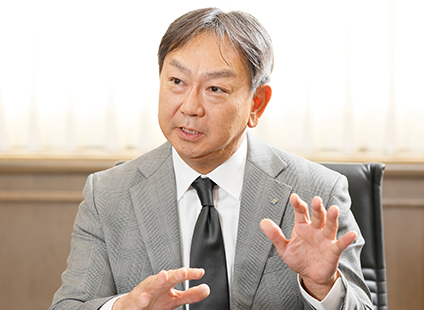
Koike Human capital management has become a widely discussed term. I believe your company is an example of success in creating an innovative organization. Could you share more about your systems for cultivating and assessing talent?
Ando Nissin's founder, Momofuku Ando, once wrote the words "Our People Define Our Worth" to employees. The idea that a company's greatest asset is its people is fundamental to our group. "EARTH FOOD CREATOR" is a vision based on the four founding principles of Shokusoku Sehei ("peace will come to the world when there is enough food"), Shokuso Isei ("create foods to serve society"), Biken Kenshoku ("eat wisely for beauty and health"), and Shokui Seishoku ("food related jobs are a sacred profession"). The Group's philosophy is to be an entity that creates food for the Earth. In particular, we value "creativity," "uniqueness," "global mindedness," and "happiness," and all actions must conform to these values.
Our core is comprised of our mission, vision, and values, and this will never change. The "10 Nissin Rules" were compiled by me as a guideline for action. Among them is "Cultivate brand ownership to the fullest". We must take responsibility for the satisfaction of the final consumer. We continue to develop our human resources based on this belief.
We are also revising our internal systems in line with the times. For example, we have implemented an internal open recruitment system. We give priority to those who voluntarily pursue the work they want to engage in, not seniority. We assume that employees will change positions once every three years, and we hope to cultivate about half of our managers through the open recruitment system. Moving forward, we are promoting a Nissin-style job-based model to expand opportunities in which skilled employees can flourish and ensure the right person for the right job, such as by making job descriptions more visible.
Koike You've been very successful with branding in Japan, including some very unique TV commercials. What strategy are you focused on overseas?
Ando Our business is directly connected to the retail industry around the world, so we make sure to have a president who can engage with the heads of the local retail industry. If a Japanese person is best for the job, we'll put them in the position. However, we have local presidents in the US, Mexico, and India.
The loyalty and engagement of our overseas staff is higher than I could have imagined. Overseas, both our seconded staff from headquarters and the local staff function as a single team. This is common to all our overseas offices. As background, we have our company's products and brand, and the organization's cohesion will largely be determined if your employees are able to take pride in both their work and the brand. That's why we still need to make good products. Our brand has been established as a company that delivers health and nutrition to the world. Now that we are trying to evolve, I believe it is important that we raise the value of our brand once again.
Koike I'd like to ask about diversity. This is an issue shared by us at Nomura Asset Management, but your ratio of female managers remains low. Could you tell us about your efforts to promote women's empowerment in the workplace?
Ando I recognize that's a challenge for our group. I believe that we have established a system that enables employees with various attributes to work fairly, including measures against harassment, LGBTQ+ considerations, and initiatives to create an inclusive organizational culture. With regard to balancing work and child-rearing, the national system has considerably improved, and our company is actively promoting initiatives to enable both men and women to take child-rearing leave. As for promoting the advancement of women, we are implementing multi-faceted initiatives such as leadership development for female employees and sponsorship programs for department heads. However, there is a time lag for female employees to become managers, so we hope to continue evaluating our progress moving forward. We will work positively to address these changes in our social infrastructure and increase our responsiveness.
Environmental Strategy: "EARTH FOOD CHALLENGE 2030"
Koike You've been proactively pursuing environmental efforts, including upwardly revising your CO2 emissions reduction target. Do you have any plans for setting targets and making disclosures for nature positive activities, or enhancing your initiatives?
Ando Our company announced the EARTH FOOD CHALLENGE 2030 environmental strategy as one of our Mid- to long-term growth strategies. In this strategy, we are promoting the effective use of resources and combating climate change as initiatives to support sustainable growth from an environmental perspective.
In May 2023, we upgraded our CO2 emission reduction targets for SCOPE1+2 and SCOPE3, respectively, as set forth in our environmental strategy, and we are accelerating our efforts to reduce CO2 emissions by introducing an internal carbon pricing system on a trial basis.
Nissin Group discloses its overall biodiversity policy for nature-positive activities and provides trial disclosure of nature-related risks and opportunities in line with the TNFD. As a concrete activity, we are strengthening our efforts to reduce the risk of deforestation by building a satellite monitoring system for the procurement of palm oil, which is a major raw material, and we are also considering efforts to reduce CO2 emissions from agriculture. We will continue to respond in line with the recommendations in the final version of the TNFD Framework, conduct scenario analysis, and work toward setting and disclosing targets.
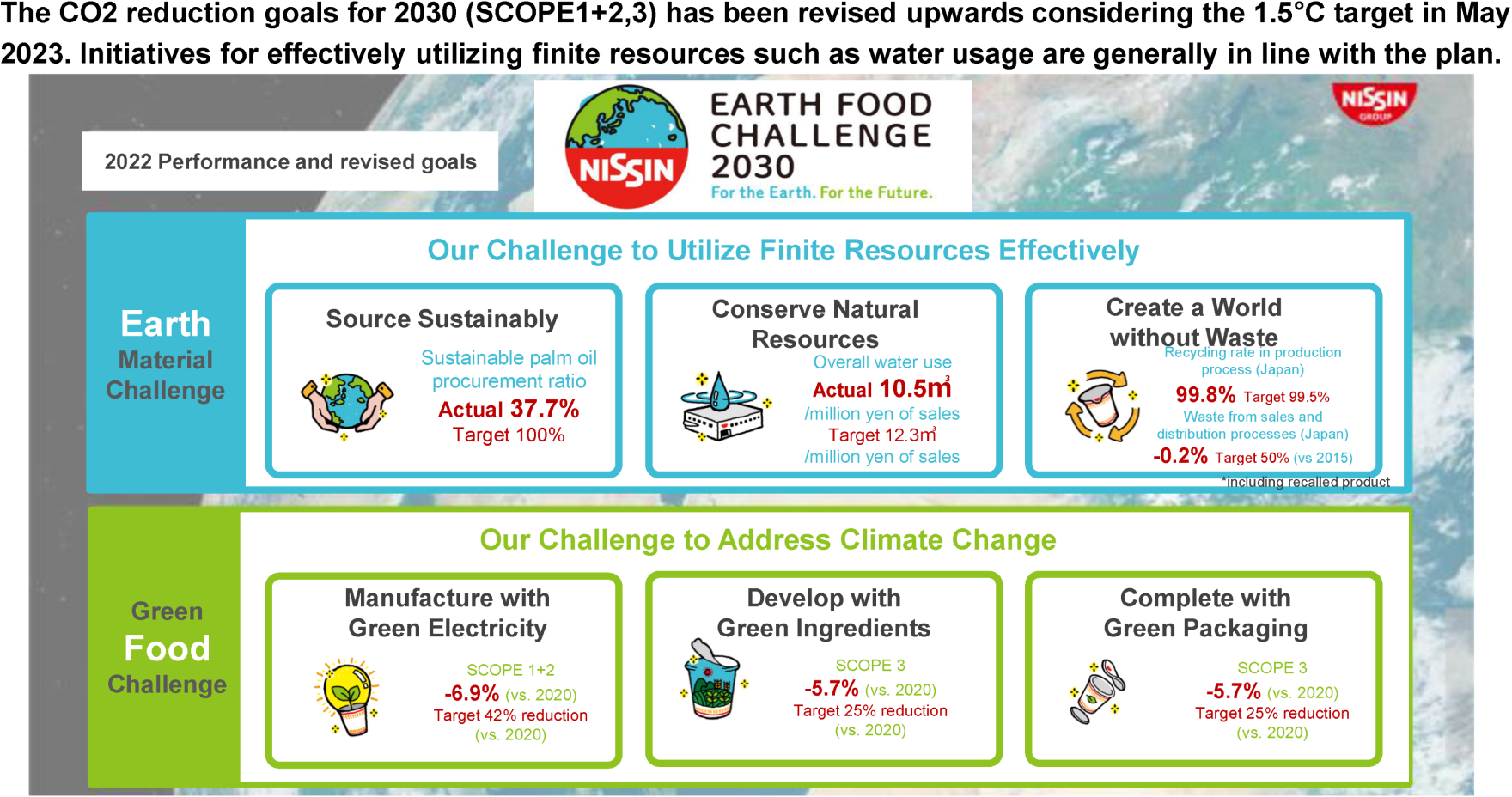
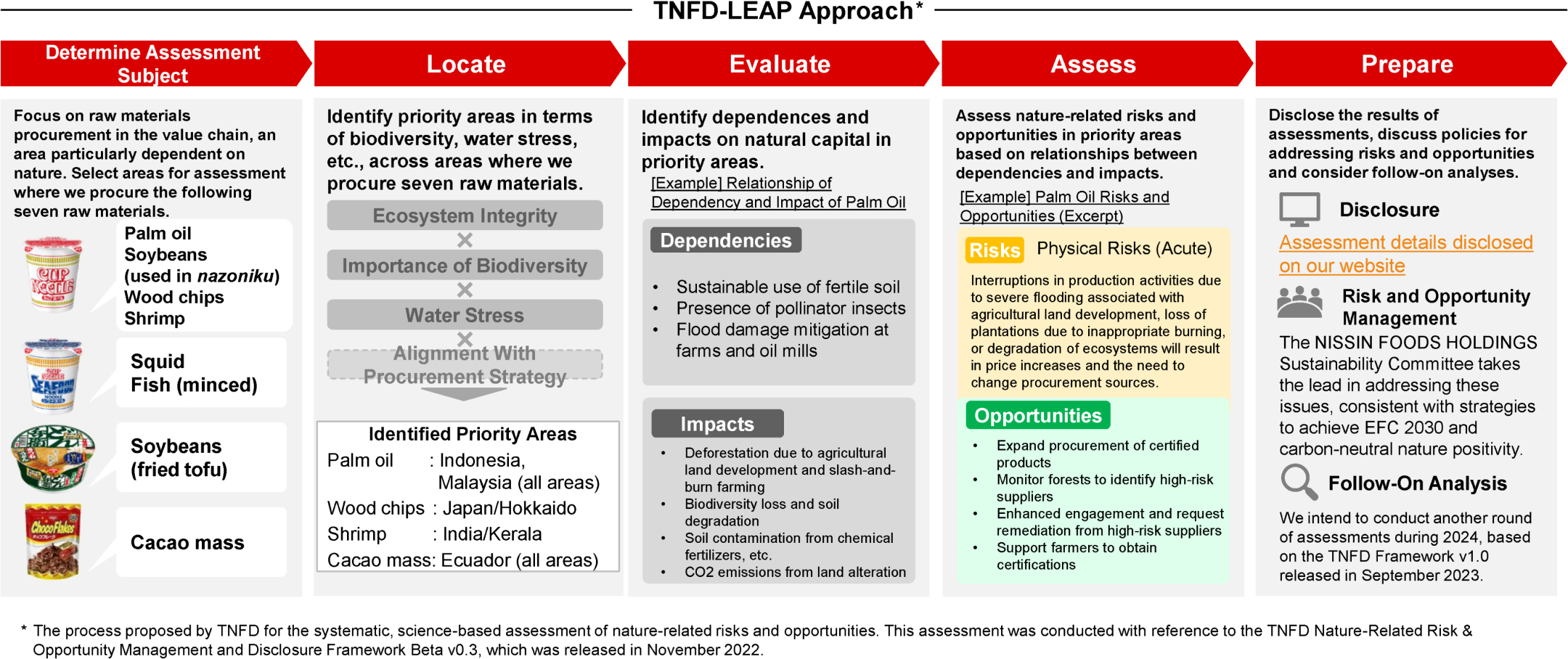
Koike As one of your company's initiatives to achieve the EARTH FOOD CHALLENGE 2030, you recently announced the transition to paper cups for Cup Noodles in the United States. What further initiatives can you envision for plastic reduction globally? We understand that it is not easy to pass on the cost of environmental protection to consumers, but is it possible through strong branding?
Ando Our company uses environmentally friendly packaging materials. In Japan, since 2019, containers used in Cup Noodle brand products have been replaced with Biomass ECO Cups, which reduce plastic consumption and CO2 emissions during incineration. In the United States, CUP NOODLES was reborn in paper cup form in January 2024, and we are actively working to reduce CO2 emissions both in Japan and overseas. As for the cost, while there is a slight increase due to the use of paper cups, it has been positively picked up by the media and favorably received by consumers, so we will make sure to thoroughly implement this process and raise our presence in this regard.
We recognize that environmental costs are necessary costs that cannot be avoided in the future, but we consider them to be one of the important measures for developing high value-added products.
Koike Thank you for today's valuable discussion. I truly appreciate your corporate strategy and growth potential. I look forward to you continuing to lead the world in environmental initiatives as well.
This report is not intended as a solicitation or recommendation with respect to the purchase or sale of any particular investment.
(Date of publication: February 29, 2024)
